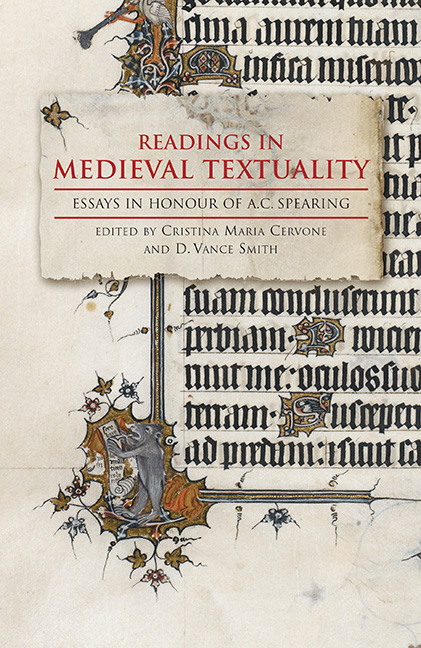Book contents
- Frontmatter
- Contents
- List of Illustrations
- List of Contributors
- A. C. Spearing's Work and Influence
- Bibliography of A. C. Spearing's Works
- I Reading Experience and Experientiality
- II Revisions and Re-visioning of Alliterative Poetry
- III Subjectivity and the Self
- IV Reading for Form
- 8 The Inescapability of Form
- 9 Destroyer of Forms: Chaucer's Philomela
- 10 Gower's Confessio Amantis and Chaucer's Canterbury Tales as Dits
- 11 Poems without Form? Maiden in the mor lay Revisited
- 12 “I” and “We” in Chaucer's Complaint unto Cervone Pity
- V Epilogue
- Works Cited
- Index
- Tabula Gratulatoria
8 - The Inescapability of Form
from IV - Reading for Form
Published online by Cambridge University Press: 25 October 2017
- Frontmatter
- Contents
- List of Illustrations
- List of Contributors
- A. C. Spearing's Work and Influence
- Bibliography of A. C. Spearing's Works
- I Reading Experience and Experientiality
- II Revisions and Re-visioning of Alliterative Poetry
- III Subjectivity and the Self
- IV Reading for Form
- 8 The Inescapability of Form
- 9 Destroyer of Forms: Chaucer's Philomela
- 10 Gower's Confessio Amantis and Chaucer's Canterbury Tales as Dits
- 11 Poems without Form? Maiden in the mor lay Revisited
- 12 “I” and “We” in Chaucer's Complaint unto Cervone Pity
- V Epilogue
- Works Cited
- Index
- Tabula Gratulatoria
Summary
In 2003, J. A. Burrow published an essay reflecting on changes in the study of medieval English literature over the fifty years since he began graduate work. At that time (and also when I read English in Oxford in 1961 to 1964), there were three alternative Oxford English courses; the first two were heavily philological and concentrated on the medieval period, but Course III, which he (and I) studied, covered English literature from Anglo-Saxon to 1830. Burrow records that he and some of his contemporaries felt that “in the medieval work as elsewhere, too little attention was paid to the qualities of the writings as literature” (278). They looked to “figures such as T. S. Eliot, W. Empson, and F. R. Leavis” for “a new criticism committed to the distinctive character and integrity of novels and especially poems, texts which differed from ordinary discourse in their structure, modes of meaning, and use of language, requiring close reading of imagery, irony, ambiguity, and the like” (278–79). Burrow's Reading of Sir Gawain and the Green Knight was an attempt to fulfill this need; he also cites A. C. Spearing's Criticism and Medieval Poetry, and his study of the Gawainpoet, as important works “inspired with similar ambitions” (279). Burrow's reminiscences preface a declaration of his dismay at the recent turn away from (if not outright rejection of) this emphasis on literary qualities in favor of a historicist approach. He instances John Bowers's book on Pearl, the collection of essays on Langland edited by Steven Justice and Kathryn Kerby-Fulton, and David Wallace's Chaucerian Polity, as well as The Cambridge History of Medieval Literature, which Wallace edited. All these works seem to ignore the literary qualities of the works under discussion; instead, as Wallace insists, each text must be understood “within the social system that produced it (and which it, in turn, produced)” (281).
In 2004, Derek Pearsall published his Presidential Address to the Modern Humanities Research Association (MHRA), in which he endorsed and extended Burrow's criticisms of the dominance of historicism in current studies of medieval literature, citing, in addition to those mentioned by Burrow, works by David Aers, Lee Patterson, and Paul Strohm.
Information
- Type
- Chapter
- Information
- Readings in Medieval TextualityEssays in Honour of A.C. Spearing, pp. 119 - 134Publisher: Boydell & BrewerPrint publication year: 2016
